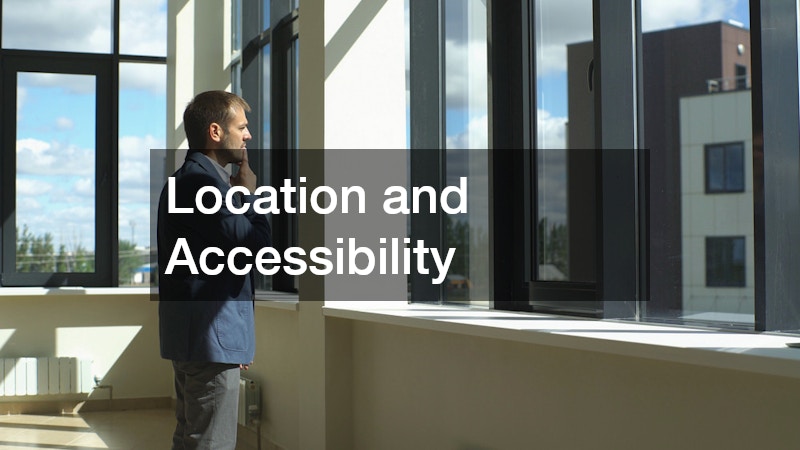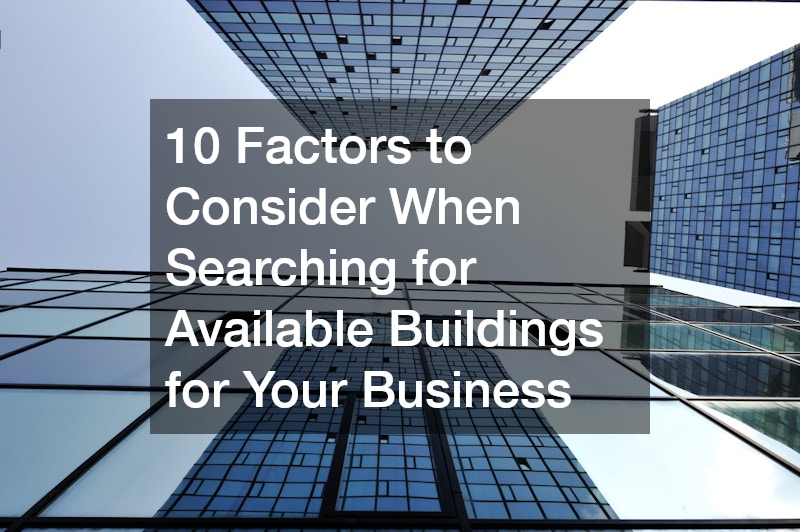Finding the perfect building for your business is more than just picking a location that looks appealing. The right commercial space can significantly influence your company’s operations, employee satisfaction, and overall success. Whether you’re a growing start-up or an established business looking to relocate, identifying available buildings that meet your needs requires careful evaluation of numerous factors. From the condition of the property to accessibility, costs, and long-term usability, each element plays a crucial role in the decision-making process.
Businesses rely on their physical spaces not just for functionality but also for projecting a professional image. For example, a tree removal company needs a facility that accommodates large equipment and easy vehicle access, while an appliance repair business benefits from a location close to customers for quick service calls. Even aspects like parking availability and security can have direct consequences on employee productivity and client satisfaction.
In this guide, we’ll explore 10 essential factors to consider when searching for available buildings for your business. We’ll examine everything from location and accessibility to structural integrity, heating and cooling costs, and the presence of pests. By the end, you’ll have a clear understanding of what to look for and how to evaluate potential properties, helping you make an informed decision that supports your company’s growth.
1. Location and Accessibility

When searching for available buildings, location is one of the most critical factors. A property’s accessibility can directly impact how easily employees, clients, and suppliers can reach your business. For instance, a tree removal company requires a location that allows for the transportation of large equipment without obstacles or traffic congestion.
Consider how major roads, highways, and intersections relate to your property. Easy access can reduce delivery times, improve employee punctuality, and enhance customer satisfaction. Additionally, assess the surrounding neighborhood and its compatibility with your business operations. Proximity to other commercial services, amenities, or complementary businesses can offer additional convenience and potential partnerships.
Accessibility isn’t limited to vehicle access. Check whether the building accommodates pedestrians, bicycles, or public transportation. Even in industries where customers rarely visit the office, having a location that employees can reach conveniently can improve morale and retention.
Another key consideration is the visibility of the building from main roads or nearby commercial areas. High visibility can increase brand recognition and attract walk-in clients, especially for businesses that rely on foot traffic or spontaneous service requests. Even for companies like a tree removal company that primarily operate off-site, being easily found by clients can reduce delays in service calls and improve overall professionalism. Evaluate signage opportunities, nearby landmarks, and how easily new customers can locate the building. A well-situated and visible property adds both convenience and marketing value to your business.
2. Costs of Heating and Cooling
One often overlooked factor in choosing available buildings is the cost of heating and cooling. Commercial HVAC contractors frequently stress that energy efficiency can significantly impact operational expenses over time. Buildings with outdated HVAC systems or poor insulation can lead to unexpectedly high utility bills.
Before signing a lease or purchase agreement, evaluate the heating and cooling systems in place. Energy-efficient models and proper insulation can reduce monthly costs, leaving more budget for core business operations. For businesses that operate year-round or require specific climate conditions—like sensitive inventory or customer comfort—reliable HVAC systems are essential.
Consider scheduling a professional inspection to identify potential issues. Consulting a commercial HVAC contractor can help assess the property’s energy efficiency, recommend upgrades, and provide cost estimates. This step ensures you’re not caught off guard by high operational expenses after moving into your new building.
3. Security Requirements

Security is a vital factor when evaluating available buildings. Commercial security guards or surveillance systems may be necessary depending on the nature of your business. A building located in a high-traffic or less secure area may require enhanced security measures, while other locations might already have adequate protection.
Assess the property’s existing security infrastructure, including alarm systems, surveillance cameras, and secure entry points. Additionally, consider the safety of your employees and clients. A well-protected property can prevent theft, vandalism, and liability issues, particularly for businesses that store valuable equipment or sensitive information.
If additional security is needed, factor in the cost of hiring a commercial security guard or implementing modern surveillance solutions. Investing in security upfront can prevent costly incidents and provide peace of mind, allowing your business to operate efficiently without unnecessary risks.
It’s also important to consider the surrounding neighborhood and any potential security risks associated with the area. Even if the building itself has strong security features, a location in a high-crime or poorly lit area may require additional measures, such as fencing, motion-sensor lighting, or 24/7 monitoring. For businesses that handle valuable equipment or sensitive client information, investing in layered security strategies can prevent break-ins, vandalism, and theft. A thorough assessment of both the building and its surroundings helps create a safe and secure environment for employees and clients alike.
4. Condition of the Building and Age
The overall condition and age of a building are key considerations for business owners. Older buildings may have charm and character, but they can come with hidden maintenance issues that require attention. Partnering with a facility maintenance company to inspect available buildings can help identify problems before committing to a lease or purchase.
Check for structural concerns, wear and tear on walls and floors, and the state of critical systems such as plumbing, electrical wiring, and HVAC units. Buildings in poor condition may require significant repairs, which can add to your operating costs. Even if a property seems visually appealing, underlying issues could impact your business operations and safety.
A thorough inspection by a facility maintenance company ensures that you understand the building’s true condition. It also helps you budget for potential repairs or renovations, giving you confidence in your investment.
5. The Presence of Pests

Pests can be more than a nuisance—they can disrupt your business operations and create health risks. Before settling on available buildings, consider scheduling a consultation with a pest control company. They can identify any existing infestations or vulnerabilities that could lead to problems in the future.
Certain building features, such as older plumbing, gaps in walls, or poorly sealed windows, may increase the likelihood of pests. Businesses in the food, healthcare, or retail industries must be especially cautious, as infestations can damage products, equipment, and reputation.
Taking proactive steps to address pest issues before moving in can save significant costs and prevent interruptions to your daily operations. A pest-free environment contributes to a safe and productive workspace for both employees and clients.
Beyond immediate infestations, it’s also important to evaluate the building’s vulnerability to future pest problems. Factors such as nearby vegetation, water sources, and waste disposal areas can attract rodents, insects, or other pests over time. For businesses that store equipment, inventory, or sensitive materials, even a minor infestation can cause damage and disrupt operations. Consulting with a pest control company to assess both current and potential risks helps you proactively address these issues before they become costly problems. Taking preventive measures creates a healthier, safer environment for employees and clients alike.
6. Proximity to Customers and Clients
The success of a business often depends on being close to its target audience. Appliance repair businesses, for instance, benefit from a location that allows for quick service calls and easy customer access. When considering available buildings, evaluate the property’s proximity to your client base.
Being conveniently located can improve response times, reduce transportation costs, and increase customer satisfaction. Additionally, consider the surrounding community’s demographics and whether they align with your target market. A well-chosen location can drive more foot traffic, generate higher engagement, and strengthen your business’s reputation.
A building that places your company within reach of your clients can also support marketing and outreach efforts. It can become a central hub for service, sales, and customer interaction, contributing to long-term business growth.
7. The Need for Regular Cleaning

Regular cleaning is essential for maintaining a safe and professional work environment. Before choosing a building, evaluate how much maintenance it will require and whether it aligns with your business’s operational capabilities. Consulting a commercial cleaning business can provide insights into the time and cost involved.
Factors to consider include the building’s size, materials, number of restrooms, and high-traffic areas. Spaces that are difficult to clean or prone to accumulating dirt may require more frequent professional services, increasing operational expenses.
Investing in a clean workspace improves employee morale, promotes a professional image, and supports health and safety standards. Considering cleaning needs upfront ensures your business is prepared to maintain a welcoming and efficient environment.
It’s also worth considering the type of surfaces and materials used throughout the building, as these can impact cleaning frequency and effort. High-traffic areas, carpeted floors, or shared facilities may require more intensive cleaning schedules to maintain hygiene and appearance. For businesses that host clients on-site or handle sensitive equipment, a consistent cleaning routine is essential to prevent contamination and maintain a professional image. Consulting with a commercial cleaning business can help you plan an effective maintenance schedule that keeps the building safe, presentable, and fully operational.
8. Structural Integrity and Safety Features
Structural integrity and safety features are non-negotiable when evaluating available buildings. Insurance agencies emphasize that a building must comply with safety codes and regulations to protect employees, clients, and property.
Check for proper fire exits, emergency lighting, alarm systems, and adherence to building codes. Structural weaknesses, such as cracks in walls, unstable flooring, or damaged support beams, can pose serious risks. Addressing these issues in advance protects your business from liability and costly repairs.
Hiring a professional inspector or consulting with insurance agencies can provide detailed evaluations of the building’s safety. Ensuring structural integrity creates a secure work environment, minimizes risk, and safeguards your business’s future.
9. Transportation and Public Transit Options
Access to reliable transportation and public transit can influence employee punctuality and convenience. A towing company, for example, often require a location with easy access to major roads for efficient operations. Available buildings should be evaluated for proximity to highways, bus routes, or rail systems, depending on your business needs.
Consider how employees, clients, and suppliers will reach your business. Properties located near well-connected transit hubs can improve commuting options, reduce traffic congestion, and expand your potential workforce.
Even if most business operations rely on private vehicles, having public transit nearby can enhance accessibility and attract employees who prefer alternative commuting methods. Transportation accessibility is a critical factor in long-term operational efficiency.
10. Parking Availability for Staff and Visitors
Adequate parking is essential for both employees and clients. An excavating company, for instance, need space for large vehicles, while traditional offices require sufficient visitor parking. Lack of parking can frustrate clients, reduce employee satisfaction, and limit overall business growth.
When evaluating available buildings, count the number of spaces, assess accessibility, and determine whether additional parking may be required. Consider whether the property allows for safe and efficient entry and exit, especially during peak hours.
If parking is limited, you may need to negotiate with neighboring businesses, lease additional lots, or implement alternative solutions. Ensuring convenient parking is an investment in client experience, employee convenience, and operational smoothness.
Selecting the right building for your business requires careful consideration of multiple factors. From location and accessibility to costs of heating and cooling, security, structural integrity, and parking, every detail plays a role in the functionality and success of your operations. By addressing these factors upfront, you can avoid unexpected expenses, operational disruptions, and safety issues.
Businesses like tree removal companies, appliance repair businesses, and excavating companies all have unique needs that must align with the features of an available building. Engaging professionals—such as commercial HVAC contractors, pest control companies, commercial security guards, and facility maintenance experts—can provide crucial insights during the decision-making process. Their expertise ensures that the property you choose meets both current needs and future growth plans.
Ultimately, investing the time and resources to evaluate available buildings thoroughly allows you to make informed choices that support your business’s long-term success. The right location, combined with well-maintained infrastructure, accessible transportation, and appropriate safety measures, creates a foundation for operational efficiency, employee satisfaction, and client trust. By considering these factors carefully, your business can secure a space that not only meets immediate requirements but also promotes sustainable growth and prosperity.


